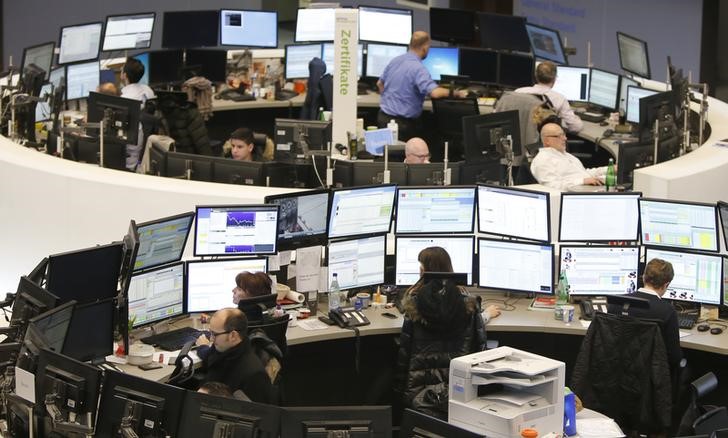* Markets seem to give U.S. presidential debate to Clinton
* Asia, European stocks swing higher
* Mexican peso jumps off record lows, Yen gives ground
* Oil tries to hold latest bounce as OPEC talk swirls
* Italian referendum set for Dec 4
By Marc Jones
LONDON, Sept 27 (Reuters) - Worries about Europe's banks wrenched stocks into reverse on Tuesday and halted a surge in Mexico's peso that followed Democrat Hillary Clinton's victory over Republican Donald Trump in the first U.S. presidential debate.
Europe's mood soured as Deutsche Bank shares DBKGn.DE hit another record low on nagging worries about the lender's health and left Wall Street futures pricing in barely a rise for the S&P 500 ESc1 and Dow Jones Industrial 1YMc1 . .N
Trading was still expected to still be frenetic after a marathon TV debate between Trump and Clinton on Monday evening that was estimated to have pulled in nearly 100 million viewers.
Markets have tended to see Clinton as the candidate of the status quo, while few are sure what a Trump presidency might mean for U.S. foreign policy, international trade deals or the domestic economy. polls after the debate suggested Clinton had bolstered her chances of winning November's election. She accused Republican Trump of racism, sexism and tax avoidance while the real estate tycoon, making his first run for public office, said Clinton's long years of service represented "bad experience".
For markets the clear victor was the Mexican peso MXN=D2 , which surged as much as 2.3 percent after hitting an all-time lows on fears that a Trump presidency would threaten Mexico's exports to the United States, its single biggest market.
Those gains had been pruned to just over 1.6 percent before the start of U.S. and Mexican trading although the currency didn't look keen to give back much more. EMRG/FRX
"The Mexican peso has become the main market proxy for Trump on-Trump off," said Saxo Bank's head of FX strategy John Hardy, pointing to its near 9 percent fall versus the dollar this year.
"It was probably becoming a bit too cheap ... but as long as you don't know the result of U.S. election that proxy (U.S. election) risk is probably going to stay."
Deutsche Bank wasn't the only European banks in the firing line. Shares in UK-based Standard Chartered STAN.L fell 2.5 percent on reports that it was facing a U.S. probe over an Indonesian investment. .SX7E .EU
Europe was also digesting news that a referendum over Italian Prime Minister Matteo Renzi's flagship constitutional reform will be held on Dec. 4, with the fate of his administration likely to hinge on the outcome. was one of the latest dates he could have picked and gives him maximum time to try and turn around what at present looks like a defeat. That offered investors some comfort and Italian bond yields fell to a 2-1/2-week low IT10YT=TWEB .
"It is being kicked down the road quite a bit, this can," said Rabobank's head of macro strategy research Elwin de Groot.
"He is trying to buy time but that could also be a risk. He is banking that he will win back a bit of public support but there is the possibility that he might not."
OIL PRESSURE
There was mixed news from the European Central Bank as data showed loans to euro zone businesses dipped slightly in August despite its massive stimulus programme. euro fell for the first time in five days, slipping 0.25 percent to $1.1225 EUR= and to 1.1563 per pound GBPEUR= .
Oil markets were also in flux as the world's largest producers gathered in Algeria to discuss ways to tackle a crude glut that has battered prices for two years now. O/R
A source from Iran, where production is on the comeback after years of international sanctions, told Reuters it wanted 12.7 percent of any new OPEC output ceiling to help it reclaim its market share. Saudi Arabia has suggested it would need Iran to freeze its production for it to do the same.
Brent crude futures LCOc1 slipped just over $1 or 2.2 percent to $46.30 a barrel, having jumped or 3.2 percent in the previous session. U.S. West Texas Intermediate (WTI) crude CLc1 , which had seen a similar rise, fell 95 cents to $44.99.
In Asia, MSCI's broadest index of Asia-Pacific shares outside Japan .MIAPJ0000PUS had recouped early losses to rise 0.6 percent and Japan's Nikkei .N225 swung 0.8 percent higher, having been down 1.5 percent at one stage.
The U.S. dollar rebounded as high as 100.83 yen from a one-month low around 100.08 JPY= though it was fading again in the first flurry of New York trading as European banking sector strains returned.
The yen's safe-haven counterparts were reclaiming ground too. Yields on U.S. 10-year Treasuries US10YT=RR , which move inversely to prices, dropped to a three-week low of 1.54 percent, from 1.60 percent overnight.
German two-year yields hit a record low as Finland became the third euro zone country after Germany and the Netherlands to see its 10-year yields drop below zero. Bank is a natural suspect for the move in the Bund yields," said Ciaran O'Hagan, strategist at Societe Generale (PA:SOGN).
<^^^^^^^^^^^^^^^^^^^^^^^^^^^^^^^^^^^^^^^^^^^^^^^^^^^^^^^^^^^ Global assets in 2016
http://reut.rs/1WAiOSC Currencies in 2016
http://link.reuters.com/tak27s Emerging markets in 2016
http://reut.rs/1ZKAaO6 European bourses in 2015
http://link.reuters.com/pap87v STOXX 600 perfomance vs European banks
http://reut.rs/2cGYHmX
^^^^^^^^^^^^^^^^^^^^^^^^^^^^^^^^^^^^^^^^^^^^^^^^^^^^^^^^^^^>
